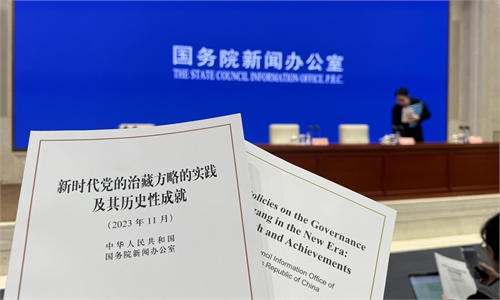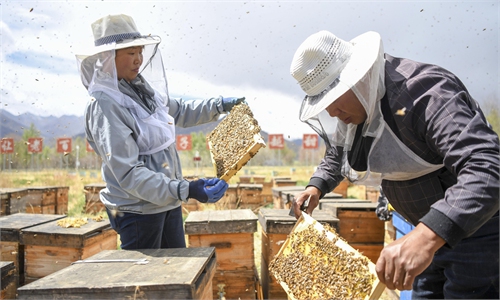China issues white paper on CPC policies on governance of Xizang in new era
‘Development of human rights in Xizang indeed a symbolic benchmark in China’: experts
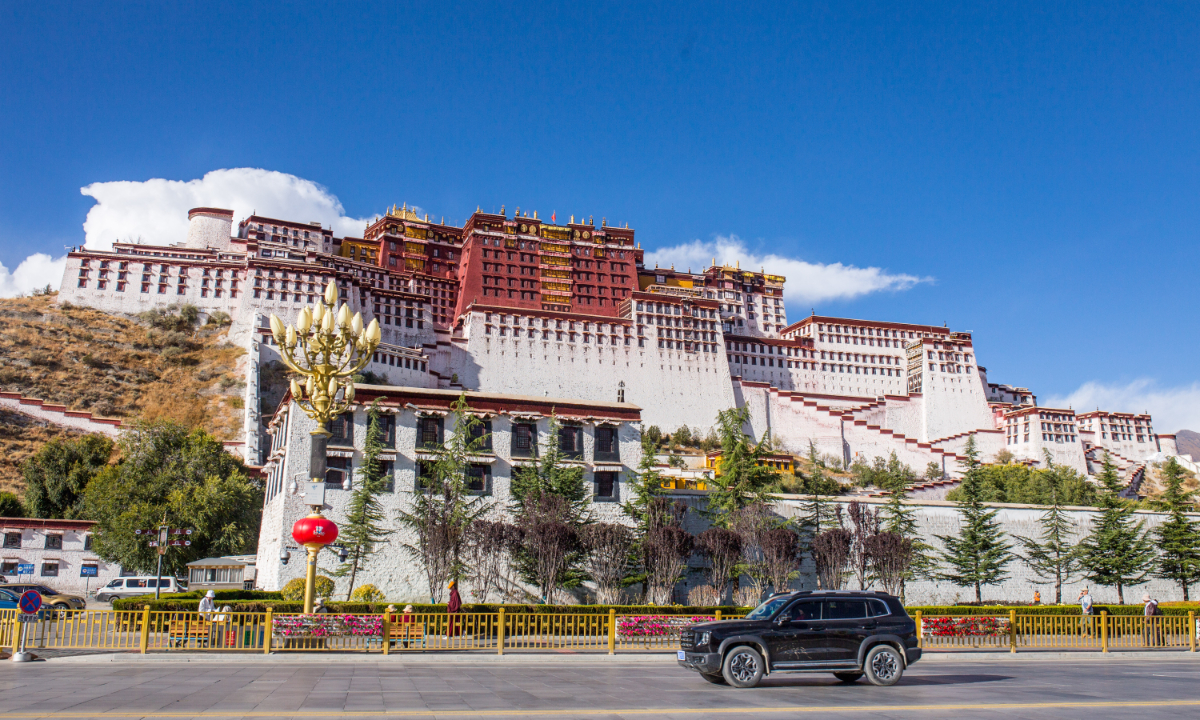
The Potala Palace in Lhasa, Southwest China's Xizang Autonomous Region Photo: Shan Jie/GT
Thanks to the policies of the Communist Party of China (CPC) on the governance of Xizang in the New Era, the southwestern Chinese autonomous region has seen progress and development in all respects, including politics, economy, culture, ethnic affairs, religion and society, a white paper released on Friday showed.
The white paper, CPC Policies on the Governance of Xizang in the New Era: Approach and Achievements, was released on Friday morning by the State Council Information Office, at a press conference at which senior officials stated the facts about the region's development and clarified misinformation about Xizang.
The white paper highlights real cases and detailed data to fully demonstrate the victory achieved in the battle against extreme poverty that had plagued Xizang for thousands of years, achievement of moderate prosperity, a more stable social situation, more prosperous economic and cultural development, better ecological environment, and happier lives for the people. Meanwhile, the Party's policy on religious affairs is fully implemented in Xizang, the fight against separatism continues to deepen, the adaptation of Tibetan Buddhism to the socialist society is continuously promoted, and a shared sense of belonging for the Chinese nation has been consolidated in the region, the white paper noted.
The release of the white paper is of significant importance. It profoundly shows that since the 18th National Congress of the CPC held in 2012, the CPC Central Committee with Comrade Xi Jinping at its core has placed high importance on the work in Xizang, Li Decheng, director of the Tibetology Research Center, told the Global Times on Friday, pointing out that the white paper has many notable highlights, from economic development and human rights to religious freedom and border strengthening.
Pema Tso, an expert from the Xizang Academy of Social Sciences, noted that the white paper released on Friday portrays the development and progress of Xizang, paying special attention to the sense of security, happiness, and fulfillment of the people in the region. "This shows that the real beneficiaries of Xizang's development and change are the broad masses of the people," Pema Tso stated.
Zhang Yun, a research fellow from the China Tibetology Research Center, told the Global Times that the release of the white paper has a background - the CPC Central Committee's sixth and seventh national meetings on Xizang, which were held in 2015 and 2020, respectively, and comprehensively summarized the experience in frontier areas, established the guiding principles, overall requirements and priority tasks. The key issue is how to further implement the guiding principles and realize lasting stability and quality development in the region.
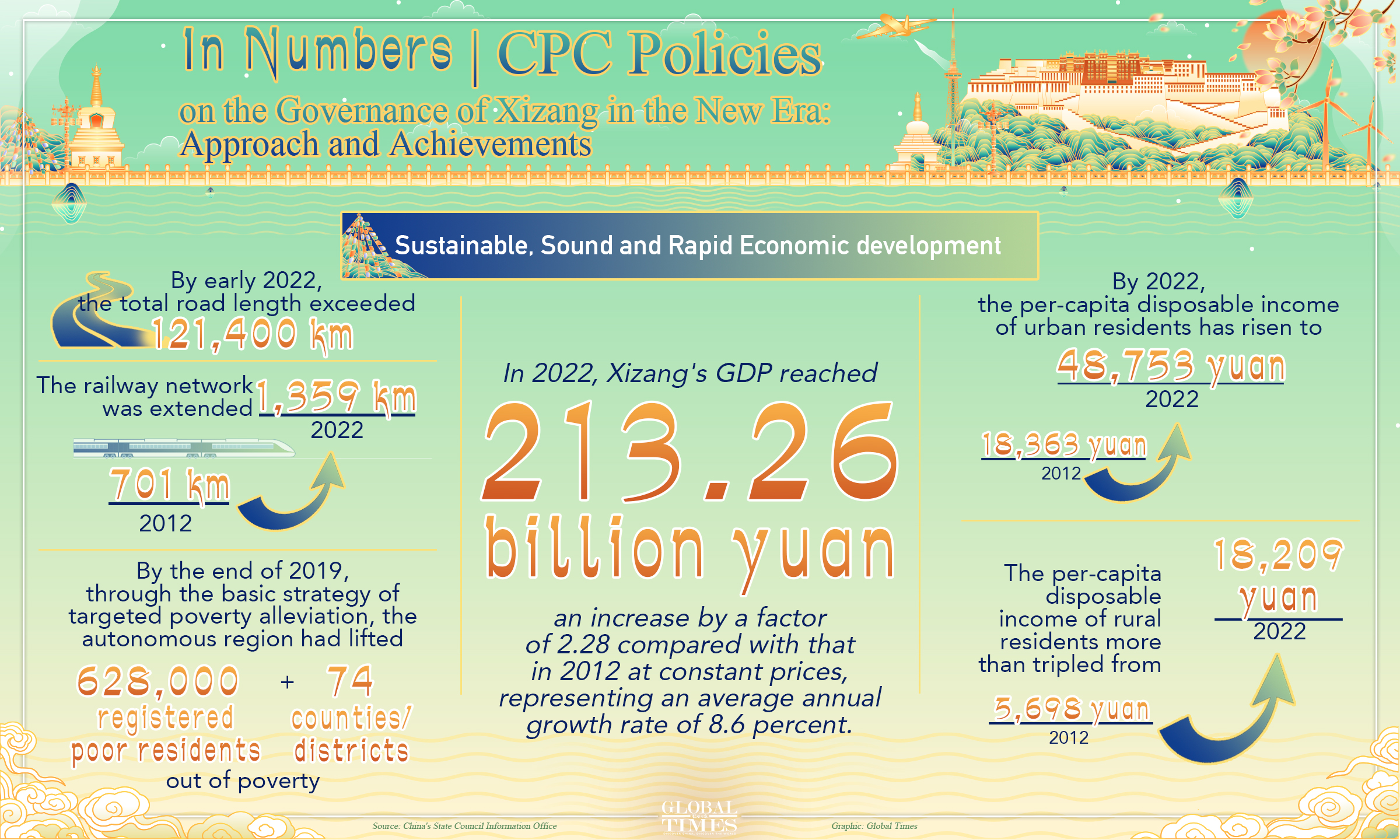
Graphic:GT
Model
The protection of human rights in Xizang has always been a focal point of attention both domestically and internationally. The white paper released on Friday vividly demonstrates Xizang's achievements in the protection of human rights through data and facts about its development.
Wang Gang, vice minister of the Publicity Department of the Communist Party of China Central Committee, stated at the press conference on Friday that "In the past decade, we have resolved the issue of significantly improving the right to life and development. More than three million people in Xizang, together with the entire population of 1.4 billion across the country, have achieved moderate prosperity in all respects and embarked on a new journey of building a modern socialist country in all respects." "Whether the people in Xizang are living happily can be seen on their faces and reflected in economic indicators," he concluded.
According to the white paper, in 2022, Xizang's GDP reached 213.26 billion yuan, an increase by a factor of 2.28 compared with that in 2012 at constant prices, representing an average annual growth rate of 8.6 percent. Its economic growth rate ranked among the highest in China.
The development of human rights in Xizang is indeed a symbolic benchmark of the comprehensive achievements made in China's human rights efforts, Li, the Tibetologist, noted. "From the state of 'absolute impoverishment' where people's rights were not guaranteed, it is only after the founding of New China and the peaceful liberation of Xizang that the people in the region have truly begun to enjoy the right to happiness," Li stated.
The right to life and development determines the right to happiness for the people. Especially since the new era, Xizang has made great developmental achievements, realizing the entry of all its people into a moderately prosperous society and embarking on the new journey of socialist modernization. Hence, the happy life of the people is fully guaranteed, suggesting that Xizang's human rights achievements are of symbolic significance on a global scale, he further explained.
Yan Jinhai, deputy secretary of the CPC Xizang Autonomous Regional Committee and chairman of the People's Government of the Xizang Autonomous Region, made the remarks on Friday while highlighting that Xizang has taken the lead in the country in establishing a 15-year publicly-funded education system from kindergartens all the way up to senior high schools.
"With 628,000 registered impoverished people lifted out of poverty and all 74 impoverished counties and districts having removed their 'poverty hat,' we have historically eradicated the problem of absolute poverty, a remarkable feat on the harsh and challenging Qinghai-Tibet Plateau," he said.
Comprehensive coverage has been achieved for monks and nuns in medical insurance, pensions, subsistence allowances, accident injury insurance, and health check expenses, marking the ground-breaking achievement in the history of Tibetan Buddhist, he said, adding that as a result, registered monks and nuns are now entitled to receive pensions for the first time.
For many years, there have been no major political, mass, or violent terrorist incidents in the region, presenting a new atmosphere of unity, harmony, and stability.
Yan said it is very safe to visit Lhasa in Xizang and walk around the densely populated Barkhor Street.
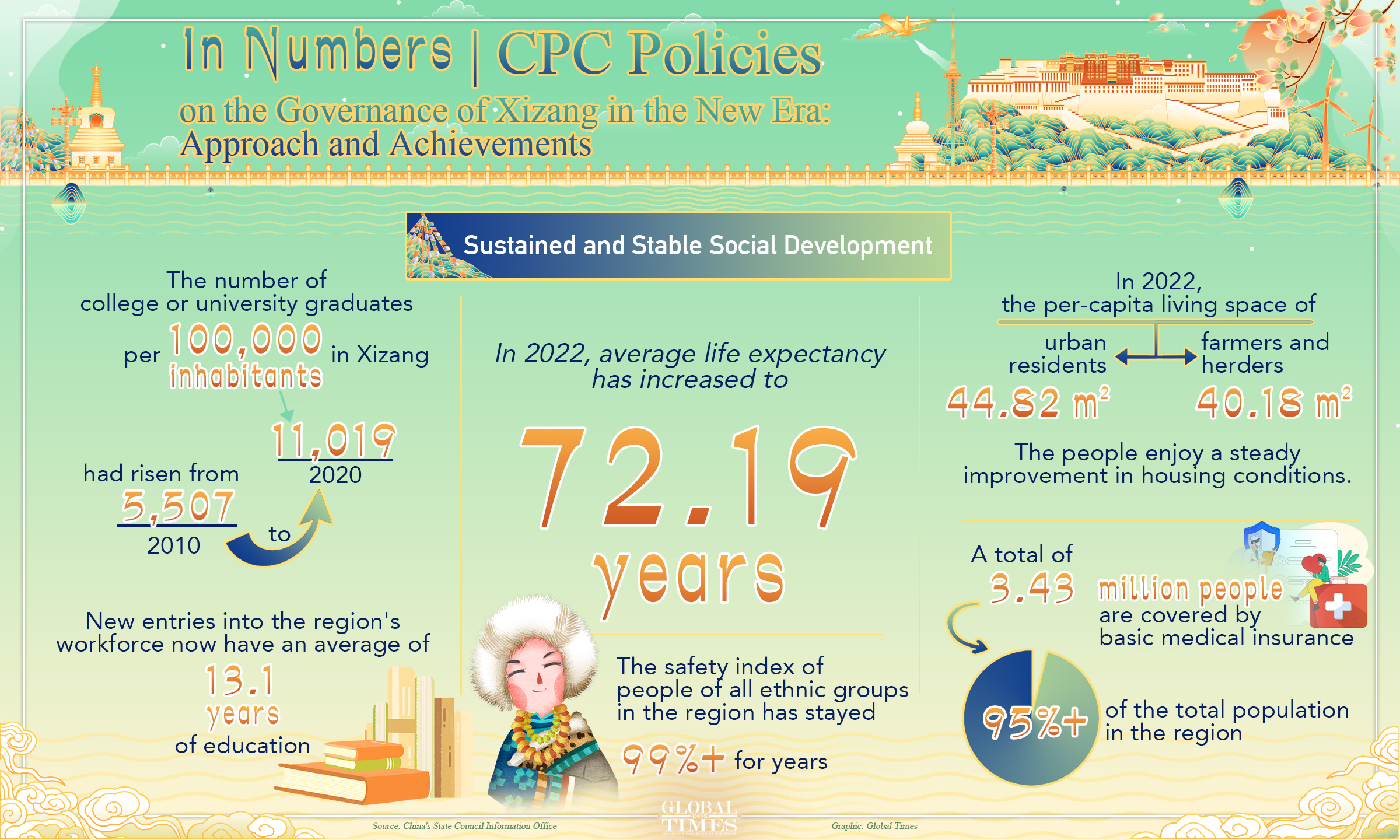
Graphic:GT
Rebuttal against slander
In recent years, foreign media and separatist forces have never ceased to sensationalize topics related to Xizang. Allegations such as "forced labor" and the vilification of boarding schools were once again refuted and clarified at the press conference on Friday.
Boarding schools have enhanced the level of education accessibility, satisfying the people's demand for high-quality educational resources and providing an excellent learning environment for children, especially those in remote areas, thus serving as a key to unlocking a brighter future for them, Xu Zhitao, vice chairman of Xizang Autonomous Region, said on Friday at the press conference.
Boarding education in China is fundamentally different from the targeted colonial-style boarding schools in some Western countries in the last century. The allegations that Tibetan children in Xizang are being forced to attend boarding schools are deliberate smearing with ulterior motives, Xu said.
Global Times reporters have visited boarding schools in Lhasa, Shannan, Nagqu, Nyingchi and other places in Xizang in recent years and found that students of all ethnicities in Xizang are guaranteed education and quality of life. Tibetan students can speak fluent Putonghua and Tibetan and confidently discuss their dreams with reporters.
Mimi, a senior student from Sog county, Nagqu who sought better educational opportunities in Shannan, said, "My home is over 700 kilometers away from the school. It is impossible for me to commute 1,400 kilometers every day. Staying at school saves a lot of time and travel expenses, eases the burden on my family, and allows me to learn more and participate in clubs of interest."
In terms of "forced labor" in Xizang, Xu continued refuting some overseas organizations' smears that claimed farmers and herdsmen in Xizang are "forced" to receive vocational education and "transferred" for employment.
Xu said at the press conference on the release of the white paper that the Chinese government has always attached great importance to protecting the labor rights of its citizens. China's Labor Law stipulates that workers have the right to equal employment and the freedom to choose their occupation, and workers should complete their work tasks and improve their vocational skills.
In recent years, the regional government in Xizang has implemented proactive employment policies, adhering to the principles of workers' independent job selection, market-regulated employment, and government-promoted employment, and has expanded employment opportunities for farmers and herdsmen.
Moreover, the region has also encouraged farmers and herdsmen to start their own businesses and seek employment on their own.
Pema Tso, the expert from the Xizang Academy of Social Sciences, said that many of the misunderstandings about Xizang are narratives constructed by the Western media with ill-intended motives.

GT


